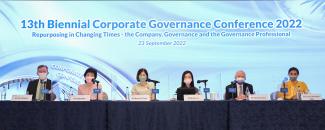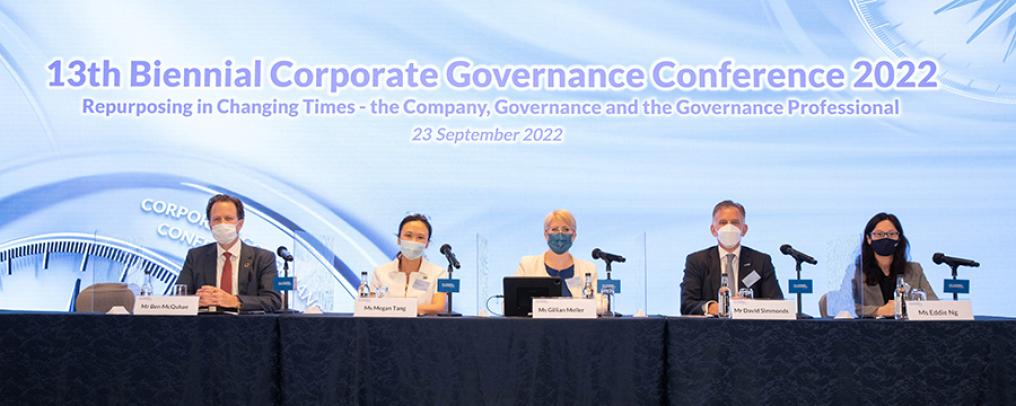
Diversity and inclusion – The importance of walking the talk
Session three of the Institute’s CGC 2022 provided insights and practical suggestions on how to get beyond the current disconnect between messaging and action when it comes to diversity and inclusion.
As discussed in the first cover story this month, the emerging business environment will be more results-oriented in its approach to companies’ track records in governance and ESG issues. This has a particular relevance for the approach to diversity and inclusion (D&I) among companies in Hong Kong – paying lip service to the importance of D&I without making real changes to recruitment practices is no longer a viable strategy.
The first speaker in session three of the Institute’s CGC 2022, Nicholas Allen, Chairman and Independent Non-Executive Director at Link Asset Management, pointed out that approaching D&I issues as an exercise in PR is missing the point. He started his presentation with a full and frank admission that he is a cynic, adding however, that a cynic ‘is someone who believes human conduct is motivated primarily by self interest’. Taking this cynical approach, he got to the heart of the issue – that it is time to stop sending the message that the voluntary efforts of individuals can effect real change.
It would be unrealistic to assume, Mr Allen suggested, that greater diversity in business, along with any of the other social changes that are becoming essential if the world is to successfully navigate the many threats on the horizon, can be achieved on a voluntary basis alone. Corporates need the incentives to act – it has to be in the interest of individuals to drive this change in corporates, requiring a ‘significant shift in consumer behaviour that can only be achieved through well-thought-out and well-communicated policies accompanying regulations and enforcement.’
It is important, he reminded the CGC audience, to keep the pressure on governments who are reluctant to make hard and unpopular decisions. He drew a compelling parallel in the context of greenwashing by corporates who spin their green credentials for customers who wish to settle consciences without actually changing their behaviour.
Take the example of carbon offsets. Mr Allen pointed out that they are cheap when compared with real carbon mitigation measures that may require expensive upfront investments, but it is often the case that those in charge of spending will be attracted by the cheaper option of carbon offsetting regardless of whether or not they work in the longer term. As self interest all too easily guides conduct, it has to be be in the interest of all three parts of society to shoulder this responsibility, governments in setting policies and regulations, businesses in adopting genuine and realistic strategies to achieve both financial and non-financial outcomes, and individuals in changing their lifestyles to adopt new behaviours.
Businesses need to consider the corporate governance choices, particularly around inclusion and diversity, that might remedy the current inaction and lead to genuine solutions. In particular, people who genuinely understand the vital importance of achieving tangible goals need to have a seat at the corporate table, and those already at the table need to be briefed to ensure they fully understand the issues.
In practical terms, this translates into the experience and skills that businesses need to be looking for when recruiting, whether it be at board, executive or entry level. ‘Diversity of background and gender are key to inculcating a culture of meeting a set of nuanced and often non-financial outcomes, not just the black and white financial goals of corporates,’ Mr Allen said. When training the workforce, it is important to ensure that critical topics remain at the forefront of education. ‘We need to create a culture of aspiring to real achievement and not spin, really walking the talk,’ he added.
What do the rules say?
Bonnie Chan, Head of Listing, Hong Kong Exchanges and Clearings Ltd (HKEX), picked up on the crucial need for genuine change, and expanded on how HKEX has flexed its muscles in advocating diversity. Using its unique position as regulator, listed company and market operator, it is able to extend influence beyond its shareholders. Hong Kong was the first jurisdiction in this region, she pointed out, to require that all listed companies have a diversity policy.
Ms Chan also highlighted a number of new requirements in the Listing Rules and Corporate Governance Code, several of which have come into effect this year.
Regular board refreshment
If the independent non-executive directors (INEDs) on a listed company board are all ‘long-serving’ (meaning that they have served more than nine years), the company will be required to appoint a new INED by the 2023 AGM. This will ensure new perspectives will be available to the board, and will address the tendency towards groupthink, particularly important in Hong Kong where family founded companies sometimes rely on a tight inner circle of advisers and board members.
Strengthening the role of the nomination committee
Recognising the important role of the nomination committee in ensuring board diversity, HKEX has imposed a mandatory requirement for all listed companies to have such a committee. The committee must not only be comprised of a majority of INEDs, it must also be chaired by an INED. This, Ms Chan emphasised, will ensure proper oversight of the directors’ nomination and recruitment process, and will be more likely to encourage diversity.
Banning single gender boards
HKEX took a big step forward by calling an end to single gender boards, making gender diversity mandatory rather than a ‘comply or explain’ approach, as in most other jurisdictions. Under the new requirements, as of July this year, listing applicants in Hong Kong must have at least one female director on board.
Existing listed issuers who have a single gender board (there are currently approximately 800 companies in this category) are required to appoint at least one female director by 2024. Ms Chan emphasises that HKEX will take steps to ensure this will not be simply a ‘check-the-box’ exercise for the sake of compliance, and companies should focus on getting individuals with the necessary skills and experience appropriate to the business.
Aiding transparency with public data
HKEX has launched, as of April this year, a new data repository on board diversity and inclusion where information on board directors such as their age, gender and years of tenure can be accessed on this platform. This can then be benchmarked against other comparable companies within the same sector, acting as a form of corporate peer pressure. As of the end of August, single gender boards have dropped by 2.7%, while 26.5% of IPO applicants in 2022 managed to have 30% female directors on the board.
Practical recommendations
Using a diversity matrix
The panel discussion at the end of session three addressed a number of practical issues to help governance professionals get up to speed on D&I. Edith Shih FCG(CS, CGP) HKFCG(CS,CGP)(PE), Past International President, and Institute Past President, and Executive Director and Company Secretary, CK Hutchison Holdings Ltd (CKH), recommended using a matrix to identify any gaps in your company’s D&I profile. CKH regularly assesses any such gaps identified by the matrix, which keeps track of the skill sets, expertise, age, years of experience on the board, gender, ethnicity, director type and committees involved in, etc. Moreover, as D&I is constantly evolving, CKH’s nomination committee meets annually to review the board’s composition. Where gaps are identified, the board will then determine whether additional directors should be appointed, and, when the opportunity arises, Ms Shih recommends appointing a female director.
She emphasised, however, that one size doesn't fit all. She recommends governance professionals assess their company’s existing D&I profile and determine how it impacts the long-term needs of the company. ‘Diversity is a precious asset; the long-term sustainability of the company predicates on our ability to be inclusive amidst these diversities,’ she said.
Ms Shih pointed out that female directors on listed company boards are mostly INEDs, retired from full-time employment in diverse fields including accountancy, law and banking. Some full-time executives also serve as INEDs of other companies, but this practice is not welcomed by investors. Ms Shih related an occasion when proxy advisers recommended a vote against the appointment of a director, who was also the CEO of a bank, as an INED. There are relatively few female executive directors, other than those with the family that controls the company, and she called for more female executives to be appointed to company boards.
Dealing with unconscious bias
Another panellist, Neil Waters, Senior Partner, Egon Zehnder, brought a different perspective to the discussion from his experience of working in executive recruitment. He pointed out that any process of selection is, by definition, discriminatory, but the role of an intermediary is to remove any unconscious biases. These tend to lead to less diversity as people often favour people like themselves.
Balancing the need to select someone the client is happy with against any unconscious bias requires intermediaries who are thoughtful and caring, but at the same time forthright about pointing out the biases, and how they might manifest in terms of the teams they build. ‘The more that we can reflect about how we develop as adults and the programmes that we're putting in place, the greater the chance of developing more diverse, inclusive teams,’ he said.
Nicholas Chilton, Head of Board Advisory, South Pacific Region, Nasdaq, emphasised that it is critical for organisations to define why they are pursuing diversity. They need, he pointed out, to consider whether they view it from the perspective of business value or whether it is the result of a desire from the community to see broader representation. The pertinent question that needs to be asked is how keen organisations are about enacting a diversity policy.
Ethnic diversity
Much of the panel discussion centred on gender diversity. Shalini Mahtani MBE, Founder and CEO of the Zubin Foundation, introduced a different perspective. ‘The best people’, she pointed out, ‘come in different shapes and sizes, they come in different colours, they come in male and female. As women exist, there are people of different races that exist too’. She points out that it is the responsibility of board directors to deliver shareholder value to mitigate risks, and the board is not doing that if they’re not bringing the best people onto the board. Talent, she emphasises, comes in diverse forms. ‘If we are going to be myopic and only look at the colour of skin or the gender, we are losing out and as board directors we are failing our shareholders,’ she said.
She also pointed to research by McKinsey showing that you will outperform significantly if you have ethnic diversity. Why? People of different ethnicities, with the same skills and competencies, but with different backgrounds, will have diverse ways of approaching different problems. You need diversity for diverse perspectives.
Ms Mahtani also highlighted some of the ongoing initiatives in Hong Kong to improve levels of D&I. Over the last five years, for example, the Zubin Foundation has produced an annual list for the government with the names of qualified people from ethnic minorities in Hong Kong. Over the course of six years, out of 120 names given, the government has taken on 30 people into Advisory and Statutory Bodies (ASBs) in Hong Kong. Hong Kong companies need to follow this lead, she added, to ‘bring the best talent to sit on our boards’.
Sharan Gill
Sharan Gill is a lawyer and writer based in Hong Kong
SIDEBAR: Shared value
As discussed in the main article, stakeholder expectations of companies’ track records on diversity and inclusion have been changing in recent years. In fact, stakeholder expectations across a wide spectrum of issues have been changing and many speakers at the Institute’s CGC 2022 highlighted the need for companies, and the governance professionals advising them, to recognise the implications of this trend.
This was very much front and centre in the first presentation of the conference, delivered by Guest of Honour, Nicolas Aguzin, Chief Executive Officer, Hong Kong Exchanges and Clearing Ltd. Good governance, he said, should not simply be about ensuring compliance with regulations. ‘The expectation is that companies should be much more focused on long-term success and balancing the need to generate profits with the interests of a much wider stakeholder group. Importantly, companies are expected to have the people and the right culture to enable this,’ he said.
He pointed out that the Covid-19 pandemic has been a turning point in changing mindsets globally. ‘Covid-19 forced the world to slow down for a period and this gave individuals and societies time to reflect on their priorities. It crystallised the world’s thinking on some of the things we always knew were important – the environment, sustainable growth, community, social mobility, and inclusion and diversity,’ he said.
This has important implications for leadership teams. ‘Realising that effective corporate governance makes good sense is the easy part. The challenge is implementation. My advice is a good place to start is with the board. For sure, regulators and policymakers have a role to play in driving change, but when the change comes from the top within a business, it is more powerful. Change that comes from within an organisation generates greater trust in the motivations and integrity of the business,’ he said.
He recommended developing governance frameworks around three concepts: creating shared value, focusing on the right risks, and ESG integration and reporting. Put simply, creating shared valued is about seeking to create value for all stakeholders, not just shareholders, and focusing on the right risks is about building resilience as a business – so that in both the good times and the bad times, the business is better positioned.
‘Understanding your areas of risk and vulnerability is essential to good governance oversight. In turn, good governance oversight is essential to building robust business and operational models, and robust business and operational models are essential to mitigating stress and damage in acute scenarios – and even to transforming risk into opportunity,’ Mr Aguzin said.
The third concept is to embed ESG integration and reporting into your governance framework. ‘ESG integration has become a critical building block of the post-Covid recovery, as investors demand more proactive risk management and reporting. It’s not enough to just set targets. You also need to communicate the actions you are taking to meet those targets. Companies that proactively communicate their ESG priorities and performance gain the trust of investors, and that trust underpins business success,’ he said.


